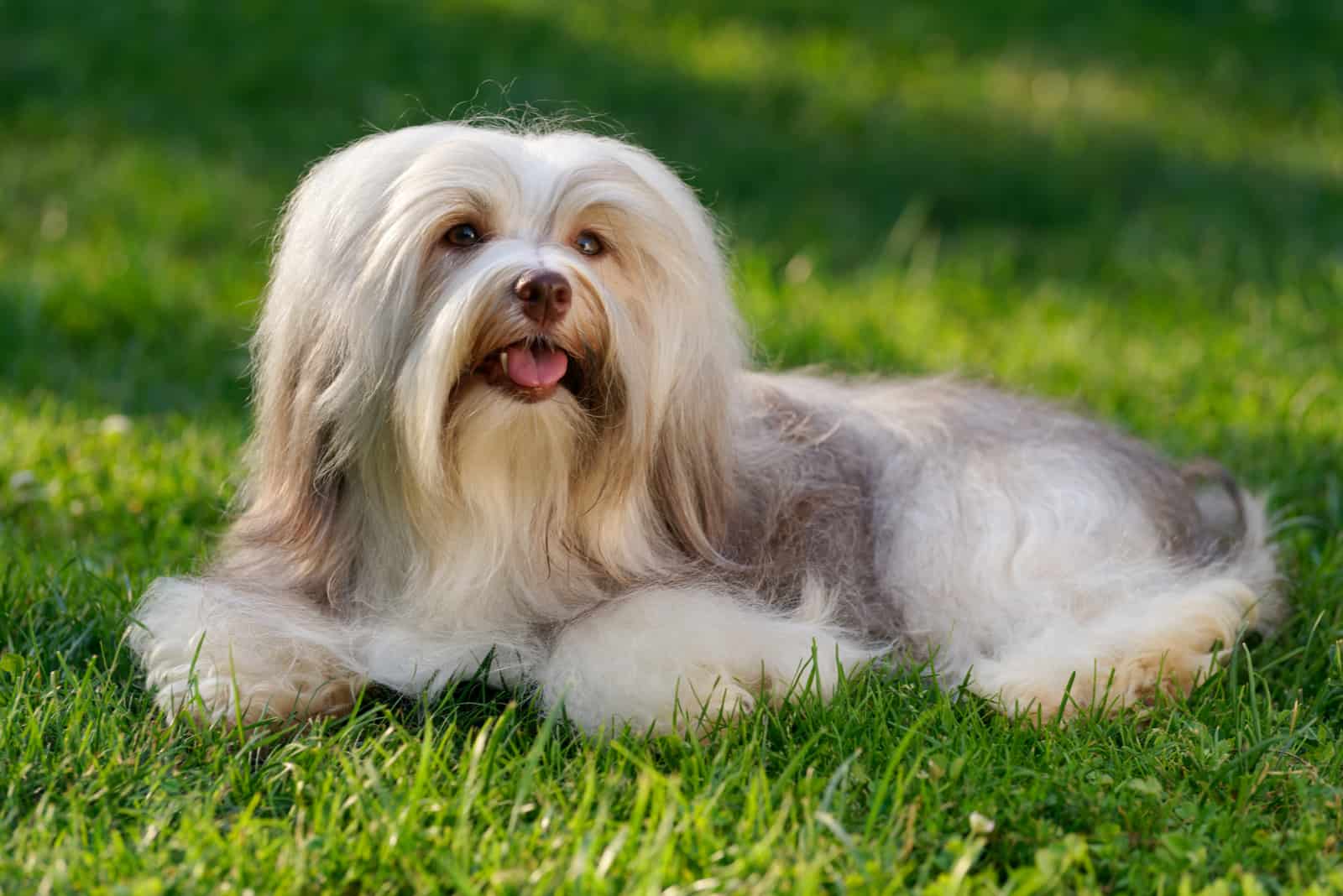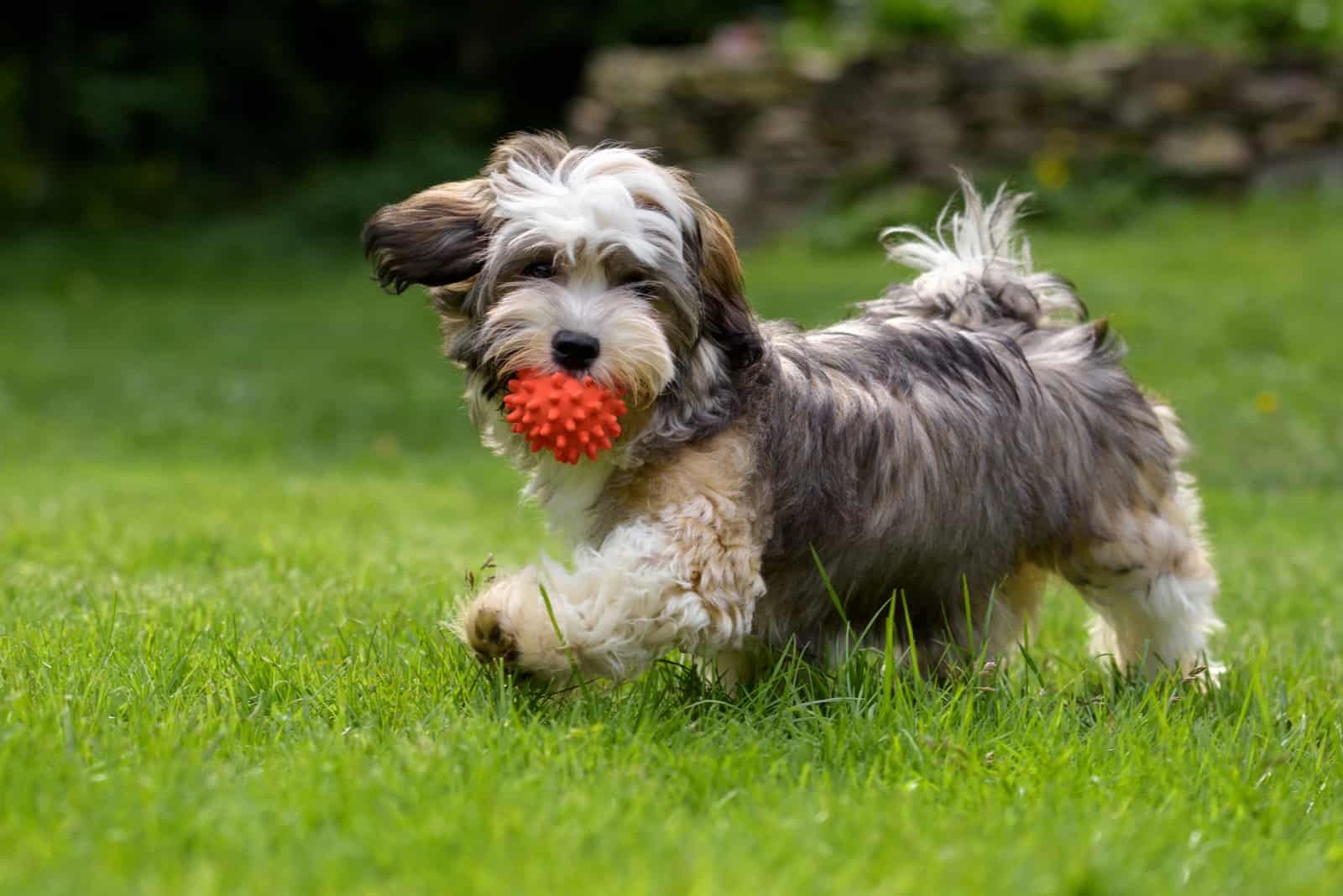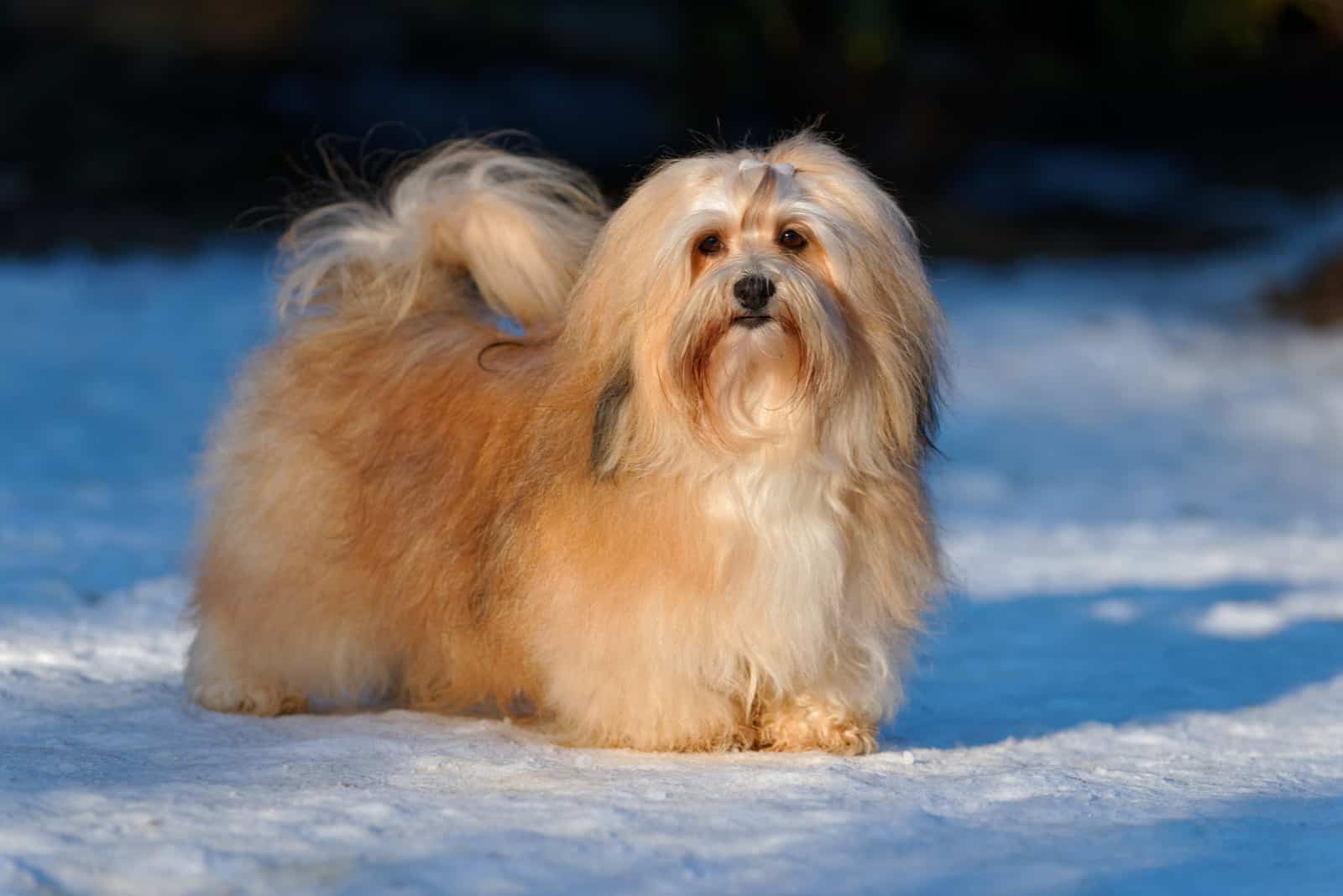Finding the right dog breed as a family pet can sometimes feel like a chore. You need one that fits in with your lifestyle and circumstances. Even when you settle on a particular breed, you might wonder whether to go for a boy or a girl dog. Are there any differences? Is one better than the other?
If you’ve decided that the Havanese is the way to go, then we’re here to help you find out the differences between male dogs and female dogs.
So, without further ado, let’s investigate male vs. female Havanese!
The Havanese Breed

If you’ve had your eye on one of these little beauties, then you’ll obviously know how cute they are. But let’s remind ourselves of their appearance and learn something of their background before we begin.
Purebred Havanese dogs originated in Spain and are cousins of the Bichon Frise and Maltese dogs. They developed from a breed known as the Tenerife, which was brought to Cuba by Spanish colonists, eventually becoming the national dog of Cuba.
They became popular in America when Cubans fled Castro’s revolution, and only 11 dogs formed the stock of all Havanese dogs today! There’s a rumor that the Poodle lent a helping hand (or gene!) in creating the beautiful dog we recognize now.
Their most distinctive feature, apart from their small size, is their long coat. Because of this coat, they are sometimes called the Havana Silk Dog.
This double coat feels silky and can grow to between 6 and 8 inches in length! Some owners like to clip the coat short to make it easier to maintain. On the whole, this dog doesn’t shed much despite the length of its coat.
In terms of coat color, they have more variations than any other breed. You’ll find them in chocolate, sable, brindle, red, champagne, black, blue, silver, cream, and white, as well as any combination of these! It’s difficult to predict the true color a pup will be once it becomes an adult. And it’s no use
looking to the parents for a clue, as there are ten different genes involved in determining the coat color.
Whatever color its coat might be, this dog will need brushing up to four times a week. They don’t shed much, but you need to keep them free from tangles and matting.
Their exercise needs are moderate, as they’re energetic pooches. They’ll need at least twenty minutes to an hour each day, perhaps a couple of short walks and a playtime. They aren’t outdoor dogs, by any means! City life will suit them just fine, so long as there’s a green space nearby and somewhere they can go to the bathroom.
These are happy, affectionate, and intelligent dogs who just love human company. This breed has a reputation for being highly trainable, and they love to learn tricks.
Now that we have a general idea of this breed’s appearance and personality, let’s explore the differences between male and female Havanese dogs, beginning with their size.
Average Size Of Havanese Dogs
To be fair, the size difference probably won’t influence your decision either way, as there isn’t too much in it. Males are slightly bigger because they have more muscle mass.
[table id=41 /]
These small dogs will reach their full size between 6 and 8 months of age, so you’ll soon know how big your dog isn’t going to be when they reach adulthood! The height is measured at the withers (the shoulders), although their heads don’t stand much above this.
As the males are bigger, they may need more food. In the long term, you will probably spend more on food for a male than a female, but not so much as to push you one way or another when deciding which gender to choose.
Are Female Dogs Easier To Train Than Males?

It’s often said that females are easier to train than males, but this varies from breed to breed.
The thing is, males usually mature slower than females. They tend to stay puppy-like for longer, meaning they are easily distracted. This makes training more interesting!
In fact, this playful, boisterous behavior will probably stay with them for life. They’ll also be really eager to please you a lot of the time. This could be your key to success when you’re training them! As male Havanese tend to be more attention-seeking, you can use this in your favor. When they do something right, make a big fuss of them, then they’ll soon figure out that it makes you happy.
It has to be said, though, that Havanese owners mostly agree that these dogs are pretty easy to train.
However, the exception to this is when it comes to potty training.
Male Vs. Female Havanese: Potty Training

It is commonly accepted that small dogs, particularly toy breeds, are difficult to housetrain. The reason for this is unclear, but it could have something to do with their small size. They have tiny bladders and very short digestive tracts, as well as a faster metabolism. This means that they process their food and water much quicker and will need to eliminate sooner.
Of course, it’s a real help if your pup has already been trained by the breeder before you get them! But if not, then you need to take some steps towards housebreaking.
Don’t despair, though, as the process shouldn’t take any longer than a week. If it does, then you may want to adjust your methods and try again. Crate training and confinement can be useful here, as they keep the dog in one place or restrict the areas in which they can wander. This helps to keep any accidents within a confined space!
Once again, you may find that male dogs are slower to learn than females.
One thing you should never do is punish your dog, whatever the gender, for having an accident. This is especially so if the offending pee or poop is not fresh when you notice it! They won’t understand why they’re being punished and will be confused.
Rather, you should reward them when they get it right. This is far more likely to bring the results you are looking for.
Male Vs. Female Havanese: Temperament
Both sexes are generally intelligent, outgoing, and have a sense of humor. However, there are some variations in character, as we shall see:
[table id=42 /]
These are generalizations, of course, and your pup will have its own personality and character. Something else to note is that these traits are true for intact dogs, which means they have not been spayed or neutered.
The question of spaying and neutering is an important factor when deciding on a male or female dog. This operation can have a profound effect on a dog’s character.
Then there’s the added question of whether to spay a female or not because of the possibility that she may produce pups. Experts generally agree that if you don’t intend to breed puppies, then you should spay your dog. Not only does it eliminate the risk of unwanted pups, but it can also reduce the possibility of certain diseases and health problems, such as cancer.
In terms of health, it is also better to neuter your male dog for the same reasons.
Socialization is another important part of getting your pup to obey etiquette. Some dogs have a tendency to bark a lot. It’s great to have a good watchdog that will alert you to potential intruders or simply announce the arrival of visitors. But constant yapping can be a nuisance to you and your neighbors.
Also, they need to get used to being around unfamiliar people, dogs, and other animals. Male Havanese generally have a harder time accepting this and will definitely benefit from socialization classes.
Sexual Behavior And The Heat Cycle

Leading on from the above points, intact dogs will display hormone-driven behavior at times. You might think that a male would be more prone to things like humping, marking territory, and mounting. However, evidence suggests that female Havanese are just as likely to do this, if not more so!
Intact males can be a real pain when they keep trying to wander off. Once they pick up the scent of a female in heat (which can travel up to 3 miles!), then you’ll have to have your wits about you to stop them escaping. A strong and sturdy fence around your yard would be a great investment.
On the other hand, females can become moody and emotional. At times they’ll be demanding, while at other times, they’ll be playful, cute, and funny. It can be a confusing time!
Also, fluctuating hormone levels during the heat cycle, pregnancy, and whelping affect the female’s coat, so she won’t always look her best at these times.
Before we move on, let’s say a few more words about the heat cycle. It’s a natural thing without which there would be no reproduction. Even so, you and your female dog will have to learn to deal with the challenges. This includes behavioral changes and the prospect of discharge being dropped around your home.
The heat cycle can begin at around 6 months, sometimes earlier. That’s not to say that they are safe to breed at this point, even though they are technically able to. This would be damaging to them and the pups, which probably would not even survive.
All of these issues are important when looking at male vs. female Havanese dogs. It all depends on whether you intend to spay or neuter your pet. And that decision may be influenced by the fact that you want to breed your dog or enter them into shows.
The thing about getting them altered (the opposite of being intact) is that it tends to balance out the temperamental differences. They all make great pets, whether intact or altered, male or female. However, dogs that have been through the operation will be much calmer and won’t display many of the sexual and hormone-driven behaviors mentioned above.
In the context of male vs. female Havanese, we can say that, in general, the neutered male may well have the edge when it comes to being easy-going, laid back, and affectionate. There’s also a chance that females may still be slightly more temperamental.
Aggression on the male side is usually found in younger, un-neutered dogs, and this disappears once they have been neutered, trained, and socialized. In females, aggression is sometimes displayed when protecting a litter or during the heat cycle. Once she has been spayed, this aggression will subside, though some moodiness may remain.
Can A Havanese Be Left Alone?

A good question! And one that we can answer immediately: no, they can’t be left alone.
More accurately, they can be left alone, just like any dog. But whether or not you should do so is another matter.
Over the centuries, dogs have been bred for different reasons. Most of these were working dogs used for herding, hunting, and protecting livestock, people, and property. Some were even used as dogs of war or for blood sports.
However, others were bred as companion dogs. Most of these tend to be small dog breeds, such as the Chihuahua and the Pug, and the Havanese are included in this group.
As the need for working dogs has diminished, the playful and affectionate side of most dog breeds has been encouraged. The relationship between humans and dogs has grown closer over the years, meaning that nearly every dog that becomes a family pet will crave human company to some degree. They thrive on it and will react badly when denied companionship.
The Havanese is top of the list when it comes to being a companion dog. They really don’t like being separated from you and will become very distressed if you leave them at home by themselves. This dog really, really wants to be your best friend!
These should by no means be considered kennel dogs! They are the epitome of a companion dog, and if there were an award for the world’s cuddliest pooch, they would win it hands down.
In relation to our quest, male vs. female Havanese, it makes no difference: neither will be happy being left alone for any length of time.
You might have seen articles that suggest that dogs can be left for between four and eight hours. While we all have different lifestyles and circumstances, this should never be a regular thing. If you have a 9–5 job and plan to leave your dog home alone all week, then this is not the dog for you. In fact, this is not an ideal setup for any dog!
Ideally, these dogs should be left for no longer than four hours at a time and not on a regular basis. If someone can’t be there, then try to get a neighbor, friend, or family member to check in on them. You might even use the services of a dog-sitter or dog-walker.
Finally, Havanese puppies should never be left alone for longer than an hour – two at the very most.
Are Male Or Female Havanese Better With Kids?

People often choose female dogs as a family pet, as they have a mothering instinct and like to nurture. They will often treat young children as if they were pups.
However, Havanese male dogs, especially neutered ones, will probably be more affectionate and playful with kids, seeing them as playmates and siblings. They will also be more tolerant and won’t object to boisterous games.
That’s not to say that female Havanese will object to children in any way. You’d need to watch an intact female when she is in heat, pregnant, or whelping, as she will be more defensive and territorial.
On the whole, these are excellent family dogs that fit in well with families.
The Havanese Lifespan: Male Vs. Female

Photo from: @ateampets
Small dogs generally live longer than large dogs. This fact has puzzled experts for some time, although it could be something to do with the fact that small dogs grow and mature more slowly.
The average lifespan for a Havanese is 14.5 years, though they can live between 13 and 16 years, maybe more.
On the whole, female Havanese live longer than males by about one year.
Male Vs. Female Havanese: Health Conditions

Sadly, all dog breeds can succumb to certain health problems during their lives. This cute and cuddly Cuban dog is no exception. But do males and females suffer from the same conditions?
Let’s find out:
• Elbow dysplasia – a malformed elbow joint that causes it to lock.
• Patellar luxation – the kneecap can become displaced, which is very painful.
• Hip dysplasia – a joint disorder that causes painful grinding of the bones. This generally affects males more than females.
• Legg-Calve-Perthes – the degeneration of the ball joint in the hip.
• Liver shunt – a condition caused by the blood being rerouted around the liver.
• Chondrodysplasia – almost exclusively found in females; this is an abnormality of the skin, eyes, and bones related to the gene that causes dwarfism.
• Deafness – bilateral or unilateral deafness is reported to be fairly common in Havanese pups. This is a genetic trait linked to coat color. Many Havanese owners don’t even realize that their pups are deaf in one ear as the dog copes brilliantly anyway.
• Retinal dysplasia – a disorder that causes folds to form in the retina. It can affect the dog’s vision but is not progressive and is not painful.
As you can see, with the exception of hip dysplasia and chondrodysplasia, the health problems are shared equally by both genders.
You can boost your chances by getting your Havanese puppy from a good breeder. Alternatively, you can get your Havanese from a rescue center or shelter. The American Kennel Club (AKC) has around 450 Rescue Network groups across the USA.
Which Is Better, Male Or Female Havanese?

It doesn’t seem fair to pick a winner as such. Both genders make amazing family pets!
They are funny, smart, and affectionate. They’ll make you laugh with their antics and keep you playing for ages before cuddling up on your lap.
Does it matter whether you pick a male or a female?
Of course, this is really up to you. Some pet owners naturally prefer one gender over the other without having any definite reasons, which is fine.
But if you are still trying to make up your mind, we’ll go over the main points once again to make them clear:
Male Havanese
Intact males may be territorial, and pups might show a bit of aggression prior to socialization. Neutered males are more easy-going and friendly. They act like puppies for much longer, probably all their lives! They like you to fuss over them and love the attention.
Though slower to learn, they will respond well to reward-based training. They’ll be happy to accept strangers but may be wary of other animals, but socialization will help them overcome this.
They bond well with the family and will share the love equally.
Female Havanese
Unspayed females will be moody and possibly show more territorial behavior than males. They do get on with kids but might be intolerant when they are in heat or nursing a litter. Spayed females are much calmer and will be less likely to display sexual behavior.
They tend to focus on one family member, although they will show affection to others at times. Oddly enough, they will probably be more willing to accept other animals but will be wary of strangers.
Again, socialization will help to solve this problem.
The key thing to remember here is that these are world-class companion dogs, whichever gender you choose! They long to be your best friend, and with the right training, love, care, and attention, they will thrive.
Read Next: 9 Havanese Breeders In Florida: No Wrong Choice Here


